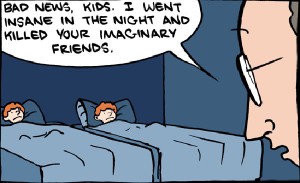I was talking with a writer friend of mine today about the lives of characters. It  may sound weird, but it is a truth in writing that your characters must become real people—or at least they should do.
may sound weird, but it is a truth in writing that your characters must become real people—or at least they should do.
Our discussion centered around character development. She is working on the draft of a novel which I had the privilege of reviewing. In our debriefing we talked about putting flesh on the characters and she said an interesting thing. I don’t think I’m giving away any of the plot by paraphrasing her. She said,
When I started, I thought it was going to be Character A’s parade—Character B was simply going to be a minor character when in reality she stole the show. And I can’t explain it but I identified more with Character C and Character B than any of the others.
There are many approaches to character creation, but I think the main thing is that the character must be a three-dimensional person or the reader won’t be able to connect with them. It’s an imperative for fiction, but equally so for non-fiction and historical fiction where you may be writing about a person who actually lived.
For example, if you write a story about Alexander the Great but don’t make him real inside the framework of your prose, readers won’t relate to his motivations, get bored, and toss your book in the trash. Even though he is an historical person, you must imbue him with physicality, personality, motivation, and emotion.
One of my favorite history writers, Barbara Tuchman, author of the Pulitzer Prize-winning The Guns of August was a master of this. She also wrote The Proud Tower, and A Distant Mirror among many others. These are sweeping histories covering many years and many personalities, some well known, others less so, but when you read her, you never get the feeling that these people are just scenery in a play. Each one stands off the page in their own right.
I think that in some ways, making a real person come off as “real”, especially historically important people, is a much harder task because very often the reader has a set of preconceived ideas about who and what that person is. Being a coward, I can’t see ever trying a straight-up history of anything. I don’t have the chops to do it well enough.
Fiction however, and even historical fiction like the work I’m doing right now, allows more latitude to create characters and situations to fit the universe I create for them. This is one part of writing that I actually find to be fun. And yes, my characters do become real to me. They become part of me, or rather, they are parts of me I’ve bitten off to use in the story.
But as my friend said, once they’re on paper, they take on a life of their own, frequently pushing the story in unexpected directions. I guess that’s a good measure of their “reality” to the reader. It also gives rise to the peculiar way writers talk about their characters.
This morning before I started work, I made the off-hand remark, “I think I need to kill someone today. That always cheers me up.”
